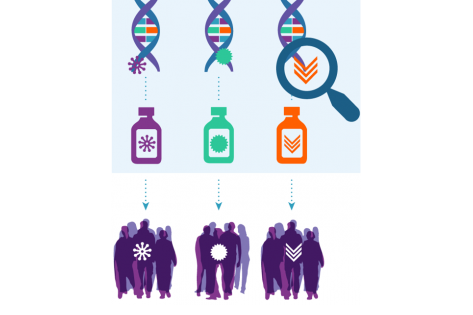
Trial Results: ECOG-ACRIN research round-up – Spring 2021
June 24, 2021
Now Enrolling: Clinical trial EA8184 is exploring if green tea extract pills can help reduce the progression of prostate cancer
June 24, 2021Ongoing Trial: For patients with advanced or rare cancers, NCI-MATCH may offer a treatment option

NCI-MATCH (EAY131) is one of the most extensive precision medicine cancer clinical trials, offering 11 targeted treatments at this time. Precision medicine refers to the tailoring of treatment based on the genetic and medical features of each patient. For example, NCI-MATCH assigns patients to treatments based on tumor gene defects rather than their cancer type.
The NCI-MATCH trial is at the forefront of discovery. Each arm—and every patient who participates—provide valuable information on potential cancer treatments.
For example, another open arm is testing a combination of two drugs (dabrafenib and trametinib) that may be effective in cancers with BRAF V600 mutations (Arm H). This arm had positive results in the first 35 patients (Salama AKS. J Clin Oncol. 2020 Aug 06). Now, it is open to additional patients to gather more data. The US Food and Drug Administration will review the results for potential registration of the dabrafenib-trametinib combination as a treatment regardless of cancer type. What a boon to patients that would be. What a demonstration of the value of precision medicine and genomic testing.
As advocates consider NCI-MATCH, we offer answers to common questions about the trial.
Which patients does NCI-MATCH serve?
NCI-MATCH enrolls patients with solid tumors, lymphoma, or myeloma, if the cancer has progressed on standard treatment. Also, patients may be eligible if they have a rare type of cancer for which there is no standard treatment.
What is the primary aim of MATCH?
NCI-MATCH is providing critical new information about possible cancer treatments. Each arm contributes valuable information on responsive versus unresponsive cancer types, especially in rare cancers where there are little or no data available. Such discoveries can move on to larger, more definitive trials.
What is the advantage of having several treatments in one trial?
The NCI-MATCH trial is seeking patients who don't have many other treatment opportunities. In addition, some of the tumor gene defects in the trial are very rare. Therefore, with several treatments in a single clinical trial, participating oncologists have a range of treatment arms ready to offer their patients.
Also, for patients at community-based sites, NCI-MATCH provides the ability to receive protocol treatment close to home. Without NCI-MATCH, these patients might otherwise have to travel to a cancer center to access a clinical trial.
—Amelia Zelnak, MD
Atlanta, GA
How are patients referred to NCI-MATCH?
Molecular testing for cancer treatment selection is a common practice. Doctors order it routinely to guide clinical care for their patients. This trial has a novel way of finding patients who may be eligible. Several commercial and academic laboratories are permitted by the National Cancer Institute (NCI) to identify and refer potentially eligible patients to the treating oncologist. These referrals are based upon each lab's standard tumor gene tests. It is the only pathway for patients to enroll in the trial.
What is unique about NCI-MATCH is that when patients' tests results show the presence of tumor mutations included in the trial, the approved labs notify the ordering oncologists. Patients may then discuss the test results with their doctor to explore the possibility of joining this trial.
Where (at what hospitals or clinics) is the trial available?
NCI-MATCH is open and enrolling patients nationwide at nearly 1100 cancer centers and community hospitals. It is available in every state, the District of Columbia, and Puerto Rico. For locations, visit the NCI website.
Are there other ways for patients to find out about eligibility?
Yes. For patients who have tumor test results from one of the NCI-approved laboratories, they (or their oncologist) may send an email directly to that lab to request a review of a genomic test. We encourage patients and physicians to do so.
The lab network also includes 17 academic labs. Most are in cancer centers and identify potential trial candidates from their own patient populations. Patients receiving treatment at the cancer centers on this list should talk to their oncologist about testing.
Is this patient referral process unique?
Yes and no. Molecular testing for cancer treatment selection is a common practice. Medicare and most insurance companies cover it. However, NCI-MATCH is the only trial to build an extensive network of testing laboratories, which is necessary to find patients for a study where molecular features determine eligibility.
NCI-MATCH is one of the most extensive precision medicine cancer clinical trials to date, with 39 treatment arms. Researchers are locating patients for the 11 remaining arms as the results are published or being analyzed for the other arms. The ECOG-ACRIN Cancer Research Group and the National Cancer Institute (NCI), part of the National Institutes of Health, are co-leading NCI-MATCH. The trial is being conducted through the NCI National Clinical Trials Network and NCI Community Oncology Research Program.
Learn more about NCI-MATCH at ecog-acrin.org.
Questions about cancer or participation in a clinical trial? Contact the NCI.

